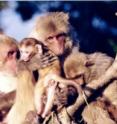Insights into primate diversity: Lessons from the rhesus macaque
New research published in BMC Genetics shows that the rhesus macaque has three times as much genetic variation as humans. However despite much of this extra variation within genes, protein function is not affected. Consequently damaging variations are at similar levels in macaques and humans -- indicating a strong selection pressure to maintain gene function regardless of mutation rate or population size. Humans and rhesus macaques shared a common ancestor approximately 25 million years ago. Although there are now over seven billion humans on the planet only 100,000 years ago the human population was as low as one million. The effective human population, the number of people required to explain current genetic variation rate, was until recently less than 8,000.
The population size of rhesus macaques is in the millions and is exceeded only by humans (among primates). However there are 13 subspecies which have evolved to exploit environments as diverse as savannah and forests, and across a range of climate zones.
A team of researchers led by Christina Barr and David Goldman from the NIH determined that the effective population size for these primates was 80,000, ten times that of humans. Analysis of genetic variation, using single nucleotide polymorphisms (SNPs), showed that the macaque genome had three times higher genetic variation than humans. Most of these SNP were previously unknown and were disproportionally found in functionally important regions of DNA and each known gene had at least one SNP.
Dr. Goldman explained, "Although macaques have more variation than humans in the protein coding regions of genes, the ratio of variation in these regions compared to non-coding regions is significantly lower. Additionally the macaque variation is less likely to alter protein function. This brings down the amount of damaging variation to a level close to what was actually seen in humans."
Dr Barr continued "Our comparative approach across primate species (human and macaques) gives us a genomic view of evolutionary selection and reaffirms the effects of population history on genetic variation. Not very long ago, on an evolutionary timescale, there were more macaques than people, and the genomes of both species are a legacy of those times past."
Source: BioMed Central
Other sources
- Insights into primate diversity: Lessons from the rhesus macaquefrom Science DailyFri, 29 Jun 2012, 2:00:26 UTC
- Insights into primate diversity: Lessons from the rhesus macaquefrom PhysorgFri, 29 Jun 2012, 0:00:40 UTC
